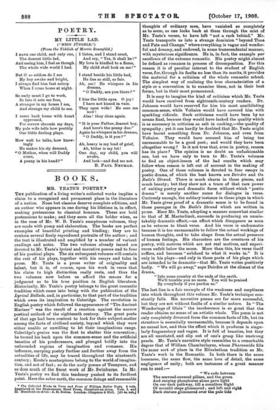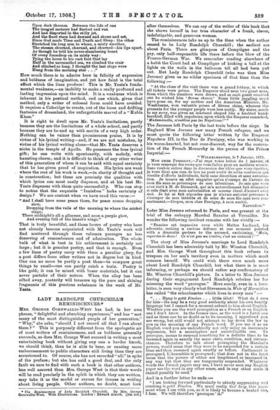BOOKS.
MR. YEATS'S POETRY.* THE publication of a living writer's collected works implies a claim to a recognised and permanent place in the literature of a nation. None but classics deserve complete editions, and an author who appears in one during his lifetime is, in effect, making pretensions to classical honours. These are bold pretensions to make ; and they seem all the bolder when, as in the case of Mr. W. B. Yeats's sumptuous volumes, they are made with pomp and elaboration. The books are perfect examples of beautiful printing and binding ; they are to contain several finely reproduced portraits of the author ; and the text is illustrated and amplified by a number of variant readings and notes. The two volumes already issued are devoted to Mr. Yeats's lyrical and narrative poems and to four of his poetical plays. The six subsequent volumes will contain the rest of his plays, together with his essays and tales in prose. Mr. Yeats is a prose writer of originality and talent, but it is, of course, upon his work in verse that his claim to high distinction really rests, and thus the two volumes now before us afford the means for a judgment as to his true position in English literature. Historically, Mr. Yeats's poetry belongs to the great romantic tradition which came into being with the publication of the Lyrical Ballads, and, in particular, to that part of the tradition which owes its inspiration to Coleridge. The revolution in English poetry which followed the appearance of "The Ancient Mariner" was the result of a reaction against the narrow poetical outlook of the eighteenth century. The great poets of that age had been content to look for their subject-matter among the facts of civilised society, beyond which they were either unable or unwilling to let their imaginations range. Coleridge's genius was the first to shatter this convention; he turned his back upon the common-sense and the artificial beauties of his predecessors, and plunged boldly into the unbounded regions of imagination and romance. His influence, carrying poetry further and further away from the actualities of life, may be traced throughout the nineteenth century; Keats's masterpieces belong to the world of imagina- tion, and not of fact ; so do the early poems of Tennyson, and so does much of the finest work of Mr. Swinburne. In Mr. Yeats's poetry we find this tendency pushed to its furthest point. Here the sober earth, the common doings and reasonable
• The Collected Works in Verse and Prose of William Butter Yeats. 8 vols. Imprinted at the Shakespeare Head Press, Stratford-on-Avon, Vols. I. and U. Stratfordson•Avon A. H. Sullen. London: Chapman & Hall. [X4 4e. net.]
thoughts of ordinary men, have vanished so completely as to seem, as one looks back at them through the mist of Mr. Yeats's verses, to have left "not a rack behind." Mr. Yeats transports us into a strange dominion "beyond Time and Fate and Change," where everything is vague and wonder- ful and dreamy, and endowed, in some transcendental manner, with mysterious significance. He is, in fact, the example par excellence of the extreme romantic. His poetry might almost be defined as romance in process of decomposition. For this reason it is of peculiar interest to the student of English verse, for, through its faults no leas than its merits, it provides the material for a criticism of the whole romantic school.
The simplest way of realising the true characteristics of a style or a convention is to examine them, not in their best forms, but in their most pronounced.
It is easy to imagine the kind of criticism which Mr. Yeats would have received from eighteenth-century readers. Dr.
Johnson would have reserved for him his most annihilating common-sense, while Voltaire would have covered him with sparkling ridicule. Such criticisms would have been by no means final, because they would have lacked the quality which is as necessary in criticism as salt in cooking,—the quality of sympathy ; yet it can hardly be doubted that Mr. Yeats might have learnt something from Dr. Johnson, and even from Voltaire. They would have accused him of being too unreasonable to be a good poet ; and would they have been altogether wrong ? Is it not true that, even in poetry, reason has its place ? The opinion is no doubt an unfashionable one, but we have only to turn to Mr. Yeats's volumes to find an object-lesson of the bad results which may follow when reason is left out of account in the making of poetry. One of these volumes is devoted to four essays in poetic drama, of which the best known are Deirdre and On. Baile's Strand. There is much charm in these pieces, and much beauty; but they show not a trace of that rare power of uniting poetry and dramatic force without which "poetic drama" is merely another name for dialogue in verse.
Curiously enough, the solitary instance in these plays in which Mr. Yeats gives proof of a dramatic sense is to be found in those passages in On Baile's Strand which are written in prase. Here Mr. Yeats, adopting a manner somewhat similar to that of M. Maeterlinck, succeeds in producing an unmis- takably dramatic effect,—an effect which disappears as soon as he returns to blank verse. And his verse is undramatic because it is too unreasonable to follow the actual workings of human thoughts, and to take shape from the actual pressure of human feelings. His characters are the creatures of his poetry, with motives which are not real motives, and experi- ences unfelt below the moon. More than this, his verse itself suffers, and becomes "subdued to what it works in." It is only in his plays—and only in those parts of his plays which are intended to be dramatic—that Mr. Yeats writes positively badly. "We will go away," says Deirdre at the climax of the drama, "Into some country at the ends of the earth.
We'll trouble you no more. You will be praised By everybody if you pardon us."
The last line is a fair example of the weakness and emptiness into which throughout this volume Mr. Yeats's technique con- stantly falls. His narrative poems are far more successful, but they are not without faults of a similar nature. In "The Wanderings of Oisin " the incoherence is so great that the reader obtains no sense of an artistic whole. The poem is not only completely divorced from the common facts of life, but its structure is essentially unreasonable, because it depends upon no causal law, and thus the effect which it produces is singu- larly fragmentary and vague. It is full of beauties, but they are all unrelated, and slip out of one's grasp like unstrung pearls. Mr. Yeats's narrative style resembles to a remarkable degree that of William Chamberlayne, whose Pltaronnida fills
the same sort of place in the Elizabethan tradition as Mr. Yeats's work in the Romantic. In both there is the same looseness, the same flow, the same love of detail, the same negligence of unity; both are instances of a great manner run to seed "We rode between The seaweed-covered pillars, and the green And surging phosphorus alone gave light On our dark pathway, till a countless flight Of moonlit steps glimmered ; and left and right Dark statues glimmered over the pale tide
Upon dark thrones. Between the lids of one The imaged meteors had flashed and run And had disported in the stilly jet, And the fixed stars had dawned and shone and set, Since God made Time and Death and Sleep : the other Stretched his long arm to where, a misty smother, The stream churned, churned, and churned—his bps apart, As though he told his never-slumbering heart Of every foamdrop on its misty way : Tying the horse to his vast foot that lay
Half in the nnvesselled sea, we climbed the stair And climbed so long, I thought the last steps were Hung from the morning star. . ."
How much there is to admire here in felicity of expression and boldness of imagination, and yet how faint is the total effect which the lines produce ! This is Mr. Yeats's funda-
mental weakness,—an inability to make a really profound and
lasting impression upon the mind. It is a weakness which is inherent in his poetical method, and one which, given that method, only a writer of colossal force could have avoided.
It requires a Coleridge to create, out of the loose and drifting fantasies of dreamland, the unforgettable marvel of a "Kubla Khan."
It is right to dwell upon Mr. Yeats's limitations, partly because they are the limitations of a whole school, and partly because they are bo und up with merits of a very high order.
Nothing can be vainer than promiscuous praise. It is by
virtue of his lyrical writing—and, if we are not mistaken, by virtue of his lyrical writing alone—that Mr. Yeats deserves a niche in the temple of Apollo. He possesses the true lyrical gift ; he can write with spontaneity, with melody, with haunting charm; and it is difficult to think of any other writer of this generation of whom it can be said with equal certainty that he has given proof of inspiration. His lyrics are weak where the rest of his work is weak,—in clarity of thought and in construction; but these are precisely the qualities with which lyrics can most easily dispense, and at his best Mr. Yeats dispenses with them quite successfully. Who can stop to notice that the exquisite " Innisfree " lacks certainty of design ? We are content when we have read this verse :— " And I shall have some peace there, for peace comes dropping slow, Dropping from the veils of the morning to where the cricket sings;
There midnight's all a glimmer, and noon a purple glow, And evening full of the linnet's wings."
That is truly beautiful, and those lovers of poetry who have not already become acquainted with Mr. Yeats's work will find scattered through these volumes passages no less deserving of remembrance and of admiration. The whole bulk of what is best in his achievement is certainly not large ; but it is genuine poetry, and that is enough. Even a few lines of poetry carry with them a peculiar glory, for
a poet differs from other writers not in degree but in kind. One can no more be partly a poet than—to compare great things to small—one can partly catch a train. Poetry is
like gold; it can be mixed with baser materials, but it can never partake of their nature. When the alloy has been sifted away, posterity will treasure up the pure and shining fragments of this precious substance in the work of Mr.
Yeats.















































 Previous page
Previous page